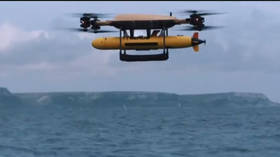UK unveils new drones for Ukraine

The British Defence Ministry has showcased advanced drones expected to be supplied to Ukraine within several weeks as a part of London’s campaign to arm Kiev with long-range weaponry.
On Wednesday, the ministry released a video on Twitter featuring several types of drones. One was seen dropping a torpedo over the water, while another was shown taking off from land while being guided by an operator, and a third was catapulted off a navy vessel deck.
“Critical capabilities are now on contract,” the video says. “First deliveries arriving next month.”
The ministry said that the UAVs would be supplied to Ukraine as part of a £92 million ($116 million) assistance package announced earlier this week. The aid is expected to be procured through the International Fund for Ukraine, a mechanism for providing urgent military support to Kiev that includes the UK, Norway, Netherlands, Denmark, Sweden, Iceland, and Lithuania.
While UK defense officials did not provide any details about the drones featured in the clip, last month the British government stated that it would send “hundreds of new long-range attack drones with a range of over 200km” to Ukraine.
Speaking to the Daily Telegraph, unnamed defense sources described the UAVs as “one-way.” The drones are mainly meant to carry munitions and have “a comparable effect to an artillery shell,” they added. One source also told the paper that the entire question of drones was shrouded in secrecy due to the issue of commercial confidentiality during the still-ongoing procurement process.
The announcement of long-range drone deliveries came after the UK provided Ukraine with Storm Shadow missiles, which have a range of more than 250km (150 miles). The missiles were subsequently used by Kiev to target civilian population in the Russian city of Lugansk, according to Moscow.
Russia has repeatedly warned the West against supplying Ukraine with arms, claiming that doing so would only prolong the hostilities. In early May, commenting on the Storm Shadow deliveries, the Foreign Ministry in Moscow denounced the move as an “extremely hostile step by London” that “clearly confirms the unprecedented level of British involvement” in the conflict.













